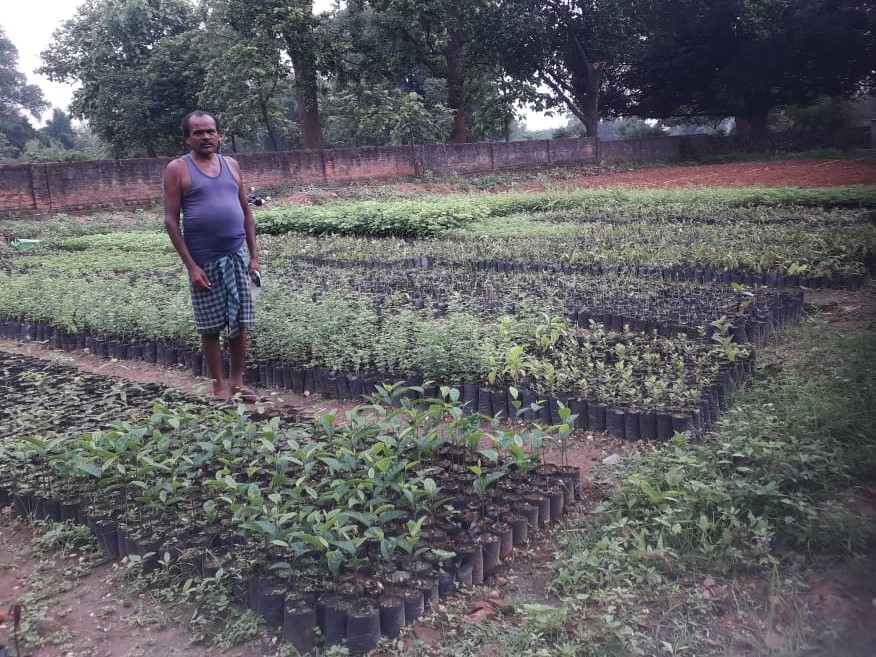Adivasi communities develop unused public land for horticulture-based livelihoods
StoryBy Chandrika Patnaik
12 October 2021
A multi stakeholder partnership between the Adivasi community, forest department, and Gram Vikas identifies and uses vacant public land for horticulture based sustainable livelihoods.

15,000 saplings ready to be planted in 30 acres of unused land.
Photograph by Jayanta Podh
Residents of the Raiberna Village Committee are planting 15,000 saplings in 30 acres of land around the village. This endeavour is aided by the support of the forest department in Sundargarh district. In June 2021, forest officials contacted Gram Vikas to motivate the community to identify land that they can use for planting fruit saplings as an alternate sustainable livelihood.
Adivasis of Raiberna are a farming community and cultivate paddy and pulses during the monsoons for their own consumption. They grow seasonal vegetables in their backyards to meet their family’s needs. Due to scarcity of water for irrigation in the area after the rainy season, residents leave their land unused after their paddy and pulses harvest. For the remaining six months of the year, men and women from the village travel seven to eight kilometers on bicycles to work in the sponge iron plants or on construction sites on a daily wage of ₹400 – ₹600 approximately.
In the year 2008, Gram Vikas began putting in place a piped water supply system in 10 out of the 12 villages in the Dumerjore Gram Panchayat under Kuarmunda block of Sundergarh district. Raiberna households got toilet and bathing rooms constructed and piped water supply installed for 100% of its 92 households in 2019.
Forest department officials from the block reached out to Gram Vikas in July 2021 to motivate the village committee to facilitate a meeting with the residents. The endeavour was to identify land belonging to residents and the government for planting fruit-bearing trees like mango, jackfruit, lemon, papaya, Indian gooseberry, tamarind, sal, cashew and henna. These would serve as an alternate source of income and promote tree cover.
The Village Committee and the residents of Raiberna identified 30 acres of land which included individual and Government land for the plantation. Each resident was provided saplings free of cost. The number of saplings provided depended on the size of the land s/he owned.
The forest department roped in the District Mineral Foundation, a non-profit body of the Pradhan Mantri Khanij Kshetra Kalyan Yojana (PMKKKY). This body, a part of the Central Government, works for the welfare of the people living in the mining affected areas. The foundation now funds the initiative in cleaning of the vacant land, digging, planting, and providing ₹1000 for 100 saplings as annual maintenance every year to the residents.
The village committee President, Pradhan Kisan says, “The plantation of fruit saplings will be beneficial for us. Since we will get paid to look after them, I am sure the trees will be healthy. This will be a sustainable livelihood once they yield fruits.”
“Seeing a lot of vacant and unused land around Raiberna belonging to residents and the Government, we took up the idea of doing plantation work and reached out to Gram Vikas. Gram Vikas has been working with the Adivasi community of Raiberna for a few years and has built trust providing them with 24X7 water and sanitation and solving its perennial water crisis. They encouraged the village committee members who in turn mobilised the 92 households. We intend to coordinate with Gram Vikas in future and take initiatives like these in other villages where they work.”
The members of the Village Development Committee discussing on the progress of the plantation.
Photograph by Tikirani Tirkey
ACKNOWLEDGEMENT
Reporting and photographs by Jayanta Podh. Ganesh Chakravarthi edited the story.
ABOUT THE AUTHOR
Chandrika Patnaik leads on content production in the Communications team.
RELATED BLOGPOSTS
Turning losses into gains: How Mallipanka farmers find success in new crops
Reviving agriculture: Mallipanka’s first strawberry farm story.
Ensuring dignity beyond life: supporting migrant families in their darkest hours
Gram Vikas ensures safe migration and dignified repatriation for deceased migrant workers, supporting bereaved families.
Collective leadership transforms ageing overhead water tank to secure household water supply for all
Kalakhadi’s aging overhead tank revived through collective leadership, ensuring sustainable water supply for the community.